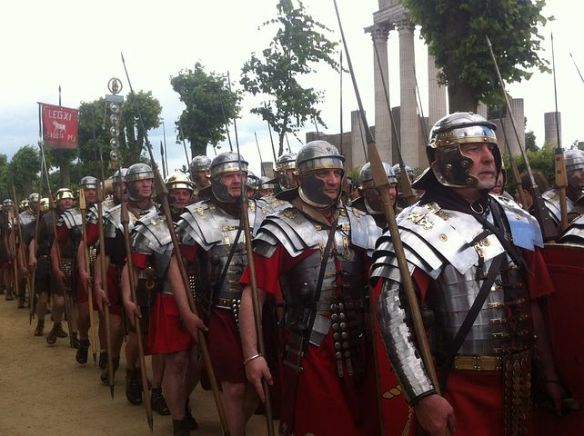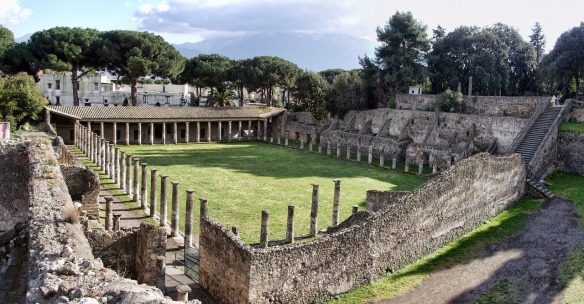
We left off in the previous article on Acts 21 with Paul in the middle of a riot and being beaten by the crowd. The Roman garrison troops had to stop the rioting and rescue this guy named Paul. The commander demanded to know, and since they were the law, what was going on and why was this man being beaten?
As the troops forcibly carry Paul to their barracks to protect him and sort out the cause of the riot, he pleads with the Tribune (commander) to let him speak to the crowd. They are on the steps of the Roman barracks. The final verse in chapter 21 states:
And when he (Tribune Commander) had given him permission, Paul, standing on the steps, motioned with his hand to the people. And when there was a great hush, he addressed them in the Hebrew language, saying:
Paul spoke Greek, Hebrew, Aramaic and who knows how many other languages. This should be no surprise that a Hebrew as was Paul could speak Hebrew. However, by this time many of the Israelis including the Jews of Judah had little external use of their native tongue. Some neighboring Jews couldn’t speak Hebrew. Greeks did not speak Hebrew. It is apparent in this passage that Paul switched from one language to another thus getting the attention of the crowd. Whose attention? The Jews but probably not the Gentiles.
Paul tells the Tribune commander and the crowd gathered at the foot of the Roman barrack steps that he once was an opponent of The Way and dragged many of them from their homes to be tried in the [Kangaroo] court of the Sanhedrin. He shares his conversion testimony beginning at the Road to Damascus. He shared the same experience in Acts 9:1-9; Acts 22:6-11; and Acts 26:9-20. It was HIS TESTIMONY. Many believers today have had a Damascus Road experience. We are startled and drawn to God to confess our past sins, desire His will, and begin witnessing.

SEE the LIGHT
Were there witnesses to Paul’s Damascus experience? Absolutely, they saw the bright light that blinded Paul but it did not blind them. They did not hear the voice. God sometimes has a special sermon of worship experience where we “see the light” but don’t hear the same Holy Spirit message. To some it is a message of awareness. To some the message adds knowledge and to others it provides insight or better understanding. Sometime people see the light but hear nothing. This is what happened to him on the Damascus Road.
Very revealing is what Paul tells the crowd in verse 14 of Acts 22. “The God of our fathers appointed you (meaning Paul, but it is Antonius who is speaking to Paul back then) to know his will, to see the Righteous One and to hear a voice from his mouth.” To see the righteous one? There is no record of Paul seeing the Just One (KJV); righteous one (ESV). Just because there is no specific recording of him seeing Jesus, other than the bright light, does not mean it didn’t happen. One of the rules of Apostleship according to Peter is actually “seeing Jesus.” Paul spent a good deal of his writing defending the fact that he was an Apostle of Jesus.
Paul goes on with his speaking to the crowd but under the protection of the Roman Garrison in Jerusalem. He explains that one time while praying in the Temple he fell into a trance. He saw him (Jesus?) who told him to get out of Jerusalem with all haste. The people will not accept his testimony but will hate Paul. Paul presents his case to the Lord by reminding him that the Jews of Jerusalem KNOW he himself had arrested many from The Way and “unto their death.” Why should they now hate him?
We should understand at this time The Way was comprised mostly of converted Jews of Judaism. The Gentiles had no direct messenger to them. Acts 22:21 tells us… “Go, for I will send you far away to the Gentiles.” This is the verse that tells us specifically that Paul is now called to the Gentiles just as Peter had already been called to the Jews.
Acts 22:22 is the turning point for the crowd. Up to the is time the crowd of Jews listened as Paul spoke to them in Hebrew. Hebrew is the language of the Israelis and not of the Gentiles. This makes one wonder if any of the Roman troops or even the commander understood what Paul was saying. God of their Temple is the center of Judaism but not necessarily the center of their witness or being. Now Paul says he is called to share the Jesus that the Jews killed with the Gentiles.
What is very unusual about this? The Jews who hated the conversion of Jews to Christianity just heard that Paul was taking the message of the cross to the Gentiles. Why should that even bother the Jewish leadership? “Go, I will send you [Paul] to the Gentiles.” This excludes a specific mission call to the Jews by Paul, yet the crowd now goes into a frenzy. The commander (called the Tribune) of the Roman garrison orders Paul inside their barracks.
Verse 24 gives a great deal of how to interrogate a witness back then. “They will examine him by flogging.” When Paul is stretched out to be flogged he informs them that he is a Roman citizen…by birth. The Tribune (commander) in verse 29 states that he was deeply concerned because he had simply bound Paul. The retribution upon him could be life ending.
This chapter ends by the Tribune calling, better said, ordering the local chief priests and their council to meet with him to explain their actions against a Roman citizen named Paul.
November 2018

